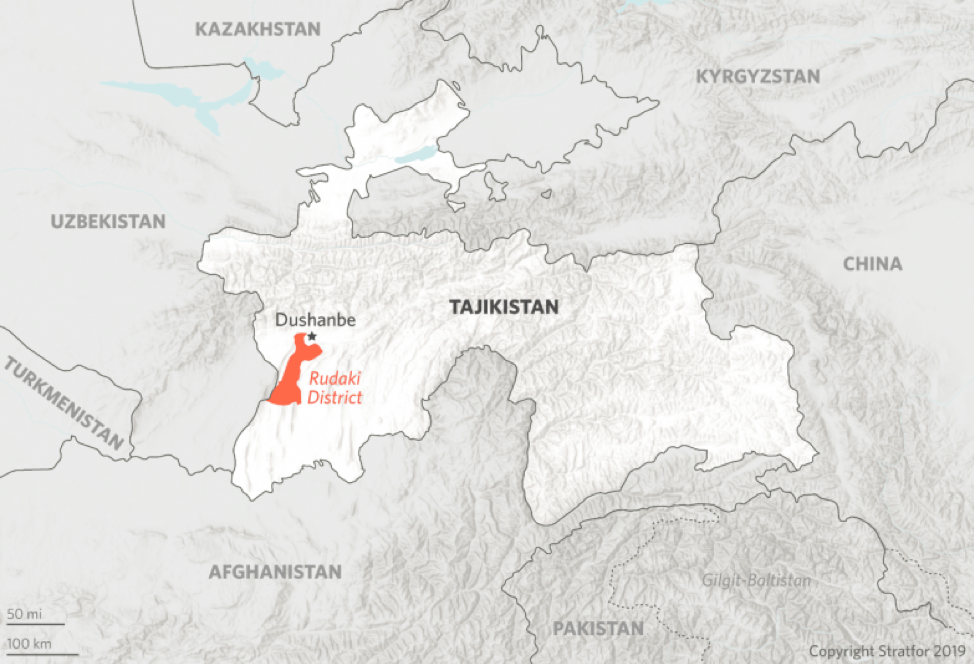This article has been republished with permission from our partner, Stratfor. The original version was first published in Stratfor’s WORLDVIEW and can be found here.
A Nov. 6 attack on a Tajik security checkpoint in Rudaki district near the border with Uzbekistan reportedly left at least 17 people dead, including 15 militants, a border guard and a police officer, though subsequent reports Nov. 9 indicate that at least five more security officers than initially reported actually died.
Authorities have detained four people suspected of involvement in the incident. According to the government, the attackers belonged to the Islamic State and entered Tajikistan from Afghanistan. Islamic State social media channels on Nov. 9 claimed the attack and attributed it to the group’s Tajikistan affiliate, though this has yet to be independently verified.
The Big Picture
The persistent threat of militancy in Tajikistan will demand the attention of Russia, China and the United States given the security interests of all three external powers in Central Asia.
The Latest in a Series of Attacks
This is the latest in a series of recent militant attacks in Tajikistan. Earlier incidents included an attack on foreign bicyclists claimed by the Islamic State in July 2018 and two deadly prison riots allegedly tied to the group in November 2018 and May 2019. Whether the Islamic State, in fact, was involved in the most recent incident remains unclear; details on the identities of the attackers have not been released, and some reports have emerged that the attackers were natives of Tajikistan’s northern Sughd region.
The Tajik government has been known to exaggerate the threat of militancy generally and of the Islamic State specifically to justify security crackdowns and political consolidation when what it actually is dealing with is local opposition to its rule. If the government is correct this time, however, then the threat of a spillover of militancy from Tajikistan’s long and porous border with Afghanistan has just grown.
The attack on the security checkpoint in Rudaki district highlights the persistent threat of militancy of all stripes that Tajikistan faces, something of direct concern to external powers in the region — and especially given the U.S. drawdown of forces from Afghanistan. Primary among these concerned external powers is Russia, which has 7,000 troops stationed at a base in Tajikistan and has voiced concerns over the militant threat stemming from Islamic State militants in northern Afghanistan.

China has also become more involved in the security sphere in Central Asia due to its concerns that militancy could spill over into its restive Uighur population; China, too, has a military presence on Tajik territory near the border with Afghanistan’s Wakhan corridor. And despite its intention to withdraw its forces from Afghanistan, the United States has also remained involved in counterterrorism and counternarcotics efforts in Central Asia. Even though all three powers share an interest in preventing or mitigating the spread of militancy in Tajikistan, tensions between them could arise if any one of these countries unilaterally increases its security activities there.
What to Watch for
Details about the attackers: Further details on the identities of the attackers will help determine their links, if any, to the Islamic State or other transnational militant groups. Connections to the Islamic State would indicate a transnational militant threat has emerged in Tajikistan, as opposed to a domestic militant threat arising from local political and security dynamics within Tajikistan, where tensions stemming from crackdowns on opposition groups and lingering animosities from the country’s civil war in the early post-Soviet period still simmer. External powers are far more likely to respond — and Tajikistan is far more likely to allow them to respond — if the Islamic State was in fact responsible. It will also be key to watch if more evidence emerges linking the Islamic State to the attack, and if there are any indications of plots by the Islamic State to conduct further attacks in the country.
Tajikistan’s next moves: Tajik security forces are known to respond to such attacks with military crackdowns and security sweeps, particularly in opposition hotbeds like the Rasht Valley and the Gorno-Badakhshan Autonomous Region of eastern Tajikistan. It will be important to see if such crackdowns lead to further clashes between security forces and opposition elements, whether political or jihadist. This could create a more tenuous security situation in the country, with greater instability increasing the potential for external involvement. If the Tajik government perceives a threat from Afghanistan that it can’t deal with directly, it would be more willing to allow such involvement.
The position of Russia and other external powers: Russia’s reaction to the attack will be key to monitor, whether in terms of increased exercises or potential deployments of additional assets and personnel to the country. A day after the attack, counterterrorism units based at Russia’s 201st military base in Tajikistan conducted a military exercise that involved a mock armed group attempting to seize control of a checkpoint and military hospital in a cantonment of the Dushanbe garrison. Russia has also attempted to have its forces return to the Tajik-Afghan border in the past, something the Tajik government has resisted — though it might relent if the threat level rises. If such attacks increase in frequency and intensity, not only could Russia’s security involvement in the country increase, counterterrorism involvement by China and the United States could also increase — potentially fostering increased competition between these powers.
 As the world’s leading geopolitical intelligence platform, Stratfor brings global events into valuable perspective, empowering businesses, governments and individuals to more confidently navigate their way through an increasingly complex international environment. Stratfor is an official partner of the Affiliate Network.
As the world’s leading geopolitical intelligence platform, Stratfor brings global events into valuable perspective, empowering businesses, governments and individuals to more confidently navigate their way through an increasingly complex international environment. Stratfor is an official partner of the Affiliate Network.

